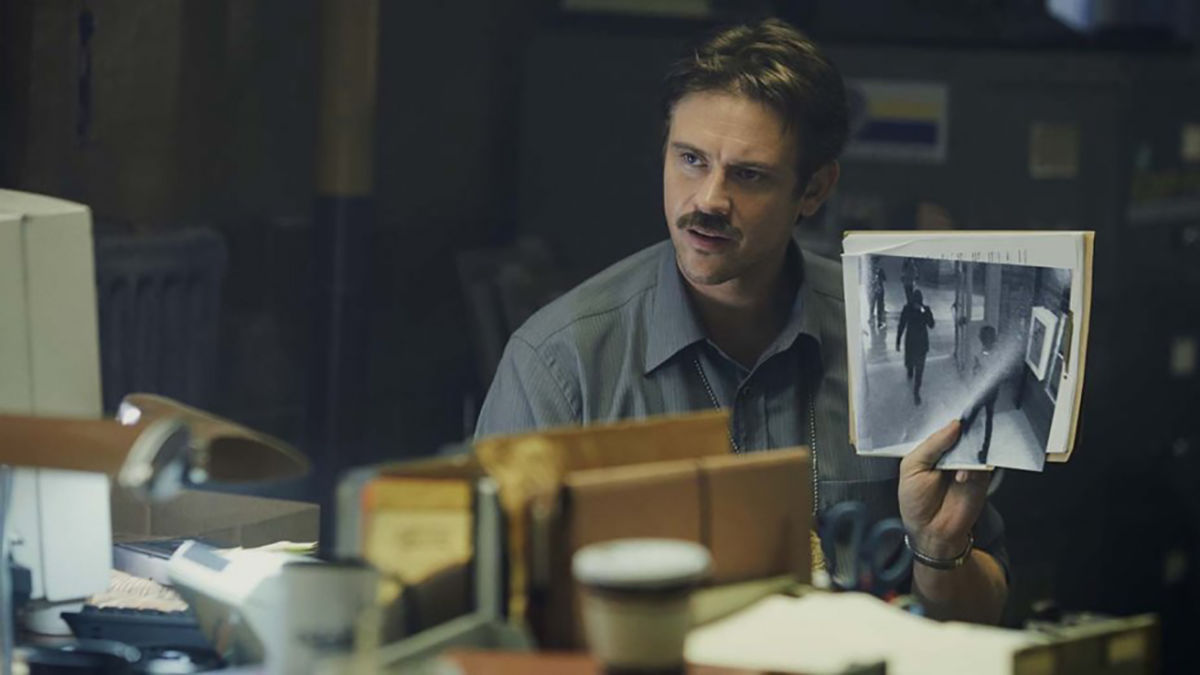For all the duds Netflix produces, In The Shadow Of The Moon isn’t one of them in the sense that it has mad ambitions. While watching it, my prevalent thought was that this could be shown at the cinema – it certainly has the potential to be on the level of movies like Predestination and Terminator (only the first two, the rest should never be spoken of). The cinematography is decent, where it starts out looking like a gritty crime procedural, and gets more futuristic in tone and setting as we progress through the narrative. There are also some absolutely breathtaking visuals, which prevents the film from being static and dull.
However, In The Shadow Of The Moon overreaches, cementing itself most ardently to the plot and structure, that it forgets all need for characterisation and pacing. It all begins in 1988, where a series of attacks start springing up all over Philadelphia, with the victims bleeding from their eyes and finding their brains liquefied, and the police start to wonder if they have a serial killer on their hands.
Police officer Locke (Boyd Holbrook) gets called in to manage a crime scene with his partner Maddox (Bokeem Woodbine), but Locke isn’t one for resting on his laurels and seems keen to engage in detective work. The lead detective on the case is his brother-in-law Holt, played by Michael C. Hall, who is truly wasted in this role, to be honest. Holt is a dick, as Locke points out many times, but we can kind of understand his perspective of not wanting anyone to insert themselves into the investigation willy nilly. There isn’t much of a crime procedural going on, since the two stumble upon the perpetrator after she conveniently appears right in front of their car. Then we get the arduous chase sequences, which are really drawn out far more than necessary.
Locke has a confrontation with the woman, who says a bunch of cryptic things, and then falls onto the train tracks. While things may be picking up for Locke professionally due to his success in handling this case, he suffers a personal loss that same night, and therefore becomes obsessed with the case and this woman. So when he hears rumblings of the same type of murders happening again 9 years later, he can’t help but think it has something to do with her.
But how is she alive, and why is she killing all these people? This question propels Locke, who keeps pursuing her through time, neglecting his personal life and relationships. Sadly, his obsession doesn’t motivate us along the plot the same way. Each time we move into a new timeline, it feels infinitely more sluggish, and it comes across as fairly pointless since we kind of know the broad strokes of the story already.
Another problem that comes up due to the film’s structure is the ageing dilemma. Each timeline we delve into is set 9 years apart, the reason having to do with the lunar cycle or some mumbo jumbo. This means that Locke needs to be aged up consistently, and the movie would require 2 actresses to play his daughter, which means that we relate to a character only for her to visually change in the next segment of the movie. Maybe I am being too kind when I speak about us being able to relate to her, since she is not fleshed out as a character. All I know about her is that she has a charm bracelet and likes bears.
They use make-up and balding wigs to age Holbrook, with him looking more and more wretched as the movie unfolds, yet isn’t able to be a convincing old man. Holbrook tries his best to give off the aura of an older man, but his physicality gives him away since he moves like a younger man. At the end he finally catches up to her, and she tells him everything, and this is where the plot twist asserts itself. It’s a decent plot twist, my only qualm is the aspects that are sacrificed in order to reach this point.
She says she is doing all this for a greater purpose, creating tragedy in her wake to prevent something worse, so it seems fairly ironic then that her actions also create such tensions in the society, with African-American citizens accusing the police of assumptive behaviour in the identification of the suspect (since she is played by the lovely Cleopatra Coleman, who is of mixed descent), certainly bringing to mind movements like Black Lives Matter. However, this is only there for a small portion of the film and is never circled back to again. This speaks once again to the ambitions the film has that never quite pan out.
How are we to believe and justify the actions of this woman when we don’t really understand with clarity the cause she is fighting for? What is the scale of this tragedy such that her actions are justified? I have more questions at the end of this movie than answers.
In The Shadow Of The Moon’s failings are due to the dependence on the plot and its twist to serve as the foundation for the entire story. Narratives don’t live and die on plot, they need strong characterisation and engaging dialogue to gain an audience’s investment. If I don’t care about Locke and feel no sympathy for him, I am not going to be able to care where the movie goes. Sci-fi needs to be rooted in humanity for it to succeed, and unfortunately, this film spends most of its time dancing on the moon.
Some of the coverage you find on Cultured Vultures contains affiliate links, which provide us with small commissions based on purchases made from visiting our site.



